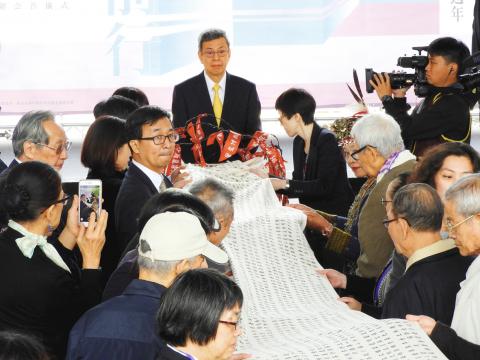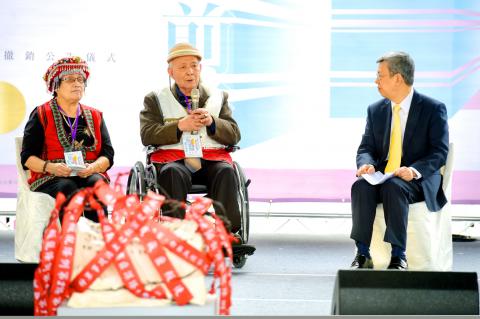A total of 1,505 people who were unjustly convicted during the authoritarian era were yesterday exonerated in a traditional Atayal ritual attended by Vice President Chen Chien-jen (陳建仁).
Of the people exonerated, 27 were Aborigines who were unjustly tried in the aftermath of the 228 Incident or during the White Terror era, Chen said at the event held in New Taipei City’s Jingmei Human Rights Memorial and Cultural Park.
Many of them were very young when they were convicted and some were executed, he said, adding that it was deeply humiliating and traumatic for the victims and their families.

Photo: Chen Yu-fu, Taipei Times
Although many of the exonerated people have passed away, the government still has to ensure that the guilty verdicts from the unjust trials are revoked, Chen said.
Taiwan should be a nation of justice and integrity, and the government must tackle the history of injustice head-on, he added.
The event coincided with the 70th anniversary of the Universal Declaration of Human Rights, making it even more significant, Chen said.

Photo: Huang Yao-cheng, Taipei Times
Promoting transitional justice demands not only exonerating the victims of political persecution, but also restoring historical truth clarifying responsibilities and promoting human rights education, he said.
To realize transitional justice, the government has established the Transitional Justice Commission, passed the Act on Promoting Transitional Justice (促進轉型正義條例) and built human rights museums, Chen said, adding that it would also clarify responsibilities for human rights violations.
Taiwan must learn from its past and improve its human rights record, as well as laws and education, he said, adding that he hopes Taiwan can become “a beacon of human rights in Asia.”
A Sbalay ritual was held at the event, with Atayal Watan Tanaga singing a traditional song in the Atayal language and blessing the attendants.
The ritual could be understood as the pursuit of truth, which is similar to the government’s goal of achieving transitional justice, the commission said.
Reconciliation cannot be achieved by offering a one-time apology, but rather requires a process of sophisticated negotiations and meaningful dialogue, it added.
Novelist Yang Kui (楊逵), best known for his work The Newspaper Man (新聞配達夫) — which was first written in Japanese — was among the people exonerated.
Yang was imprisoned for 12 years for publishing “The Declaration of Peace” in 1949, in which he called for freedom of speech and urged the government to release political prisoners.
Although Yang passed away in 1985 at the age of 79, his granddaughter, acting commission chairperson Yang Tsui (楊翠), said that his exoneration means a lot to her family, especially her parents.
They can “now make peace with themselves,” Yang Tsui said, adding that Yang Kui’s five children, some of whom are in their 80s, have been haunted by their experiences during the White Terror era.
The commission, established in May, on Oct. 5 exonerated 1,207 people who had been unjustly convicted.
Over the next four months, the commission is to exonerate about 10,000 more victims of political persecution.
Additional reporting by CNA

MAKING WAVES: China’s maritime militia could become a nontraditional threat in war, clogging up shipping lanes to prevent US or Japanese intervention, a report said About 1,900 Chinese ships flying flags of convenience and fishing vessels that participated in China’s military exercises around Taiwan last month and in January last year have been listed for monitoring, Coast Guard Administration (CGA) Deputy Director-General Hsieh Ching-chin (謝慶欽) said yesterday. Following amendments to the Commercial Port Act (商港法) and the Law of Ships (船舶法) last month, the CGA can designate possible berthing areas or deny ports of call for vessels suspected of loitering around areas where undersea cables can be accessed, Oceans Affairs Council Minister Kuan Bi-ling (管碧玲) said. The list of suspected ships, originally 300, had risen to about

DAREDEVIL: Honnold said it had always been a dream of his to climb Taipei 101, while a Netflix producer said the skyscraper was ‘a real icon of this country’ US climber Alex Honnold yesterday took on Taiwan’s tallest building, becoming the first person to scale Taipei 101 without a rope, harness or safety net. Hundreds of spectators gathered at the base of the 101-story skyscraper to watch Honnold, 40, embark on his daredevil feat, which was also broadcast live on Netflix. Dressed in a red T-shirt and yellow custom-made climbing shoes, Honnold swiftly moved up the southeast face of the glass and steel building. At one point, he stepped onto a platform midway up to wave down at fans and onlookers who were taking photos. People watching from inside

Japan’s strategic alliance with the US would collapse if Tokyo were to turn away from a conflict in Taiwan, Japanese Prime Minister Sanae Takaichi said yesterday, but distanced herself from previous comments that suggested a possible military response in such an event. Takaichi expressed her latest views on a nationally broadcast TV program late on Monday, where an opposition party leader criticized her for igniting tensions with China with the earlier remarks. Ties between Japan and China have sunk to the worst level in years after Takaichi said in November that a hypothetical Chinese attack on Taiwan could bring about a Japanese

The WHO ignored early COVID-19 warnings from Taiwan, US Deputy Secretary of Health and Human Services Jim O’Neill said on Friday, as part of justification for Washington withdrawing from the global health body. US Secretary of State Marco Rubio on Thursday said that the US was pulling out of the UN agency, as it failed to fulfill its responsibilities during the COVID-19 pandemic. The WHO “ignored early COVID warnings from Taiwan in 2019 by pretending Taiwan did not exist, O’Neill wrote on X on Friday, Taiwan time. “It ignored rigorous science and promoted lockdowns.” The US will “continue international coordination on infectious